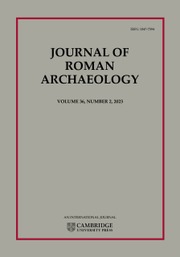Crossref Citations
This article has been cited by the following publications. This list is generated based on data provided by
Crossref.
Feldman, Michal
Harbeck, Michaela
Keller, Marcel
Spyrou, Maria A.
Rott, Andreas
Trautmann, Bernd
Scholz, Holger C.
Päffgen, Bernd
Peters, Joris
McCormick, Michael
Bos, Kirsten
Herbig, Alexander
and
Krause, Johannes
2016.
A High-CoverageYersinia pestisGenome from a Sixth-Century Justinianic Plague Victim.
Molecular Biology and Evolution,
Vol. 33,
Issue. 11,
p.
2911.
Haldon, John
Elton, Hugh
Huebner, Sabine R.
Izdebski, Adam
Mordechai, Lee
and
Newfield, Timothy P.
2018.
Plagues, climate change, and the end of an empire. A response to Kyle Harper's The Fate of Rome (2): Plagues and a crisis of empire.
History Compass,
Vol. 16,
Issue. 12,
Rott, Andreas
Päffgen, Bernd
Haas-Gebhard, Brigitte
Peters, Joris
and
Harbeck, Michaela
2018.
Family graves? The genetics of collective burials in early medieval southern Germany on trial.
Journal of Archaeological Science,
Vol. 92,
Issue. ,
p.
103.
Chouin, Gérard
2018.
Reflections on plague in African history (14th–19th c.).
Afriques,
Bramanti, B.
Zedda, N.
Rinaldo, N.
and
Gualdi-Russo, E.
2018.
A critical review of anthropological studies on skeletons from European plague pits of different epochs.
Scientific Reports,
Vol. 8,
Issue. 1,
Ledger, Marissa L.
Stock, Friederike
Schwaiger, Helmut
Knipping, Maria
Brückner, Helmut
Ladstätter, Sabine
and
Mitchell, Piers D.
2018.
Intestinal parasites from public and private latrines and the harbour canal in Roman Period Ephesus, Turkey (1st c. BCE to 6th c. CE).
Journal of Archaeological Science: Reports,
Vol. 21,
Issue. ,
p.
289.
Doerfler, Maria E
2019.
Gone but Not Forgotten? Retrieving the Migrant in Late Antiquity.
Journal of the American Academy of Religion,
Vol. 87,
Issue. 4,
p.
1153.
Mordechai, Lee
Eisenberg, Merle
Newfield, Timothy P.
Izdebski, Adam
Kay, Janet E.
and
Poinar, Hendrik
2019.
The Justinianic Plague: An inconsequential pandemic?.
Proceedings of the National Academy of Sciences,
Vol. 116,
Issue. 51,
p.
25546.
Spyrou, Maria A.
Bos, Kirsten I.
Herbig, Alexander
and
Krause, Johannes
2019.
Ancient pathogen genomics as an emerging tool for infectious disease research.
Nature Reviews Genetics,
Vol. 20,
Issue. 6,
p.
323.
Eisenberg, Merle
and
Mordechai, Lee
2019.
The Justinianic Plague: an interdisciplinary review.
Byzantine and Modern Greek Studies,
Vol. 43,
Issue. 02,
p.
156.
Henning, Joachim
McCormick, Michael
Enciso, Lauro Olmo
Rassmann, Knut
and
Eyub, Eyub Fikrit
2019.
Reccopolis revealed: the first geomagnetic mapping of the early medieval Visigothic royal town.
Antiquity,
Vol. 93,
Issue. 369,
p.
735.
Trément, Frédéric
2020.
Faut-il réhabiliter le climat et les microbes ?.
Histoire & Sociétés Rurales,
Vol. Vol. 53,
Issue. 1,
p.
115.
Bresson, Alain
2020.
Fates of Romes.
Journal of Roman Studies,
Vol. 110,
Issue. ,
p.
233.
Gurushankara, Hunasanahally Puttaswamygowda
2021.
Pandemic Outbreaks in the 21st Century.
p.
139.
Colleter, Rozenn
Bataille, Clément P.
Dabernat, Henri
Pichot, Daniel
Hamon, Philippe
Duchesne, Sylvie
Labaune-Jean, Françoise
Jean, Stéphane
Le Cloirec, Gaétan
Milano, Stefania
Trost, Manuel
Steinbrenner, Sven
Marchal, Marine
Guilbeau-Frugier, Céline
Telmon, Norbert
Crubézy, Éric
Jaouen, Klervia
and
Bondioli, Luca
2021.
The last battle of Anne of Brittany: Solving mass grave through an interdisciplinary approach (paleopathology, biological anthropology, history, multiple isotopes and radiocarbon dating).
PLOS ONE,
Vol. 16,
Issue. 5,
p.
e0248086.
Quade, Leslie
and
Gowland, Rebecca
2021.
Height and health in Roman and Post-Roman Gaul, a life course approach.
International Journal of Paleopathology,
Vol. 35,
Issue. ,
p.
49.
Sève, Michel
2021.
Varia Philippica, 3. Que s’est‑il passé à Philippes dans la seconde moitié du vie s. apr. J.‑C. ?.
Bulletin de Correspondance Hellénique,
p.
47.
McCormick, Michael
2021.
Gregory of Tours on Sixth-Century Plague and Other Epidemics.
Speculum,
Vol. 96,
Issue. 1,
p.
38.
Kay, Janet E
and
Koncz, István
2023.
Archaeological Approaches to Multiple Burials and Mass Graves in Early Medieval Europe.
Medieval Archaeology,
Vol. 67,
Issue. 1,
p.
115.
Catalan Vidal, Jordi
2023.
Crises and Transformation in the Mediterranean World.
p.
345.




